Mathematics
Mathematics
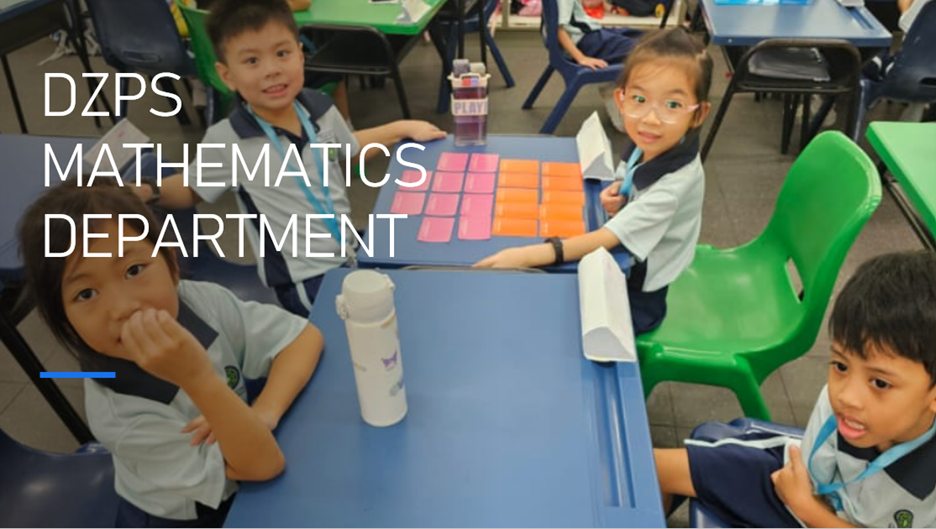
Vision:
Self-directed Maths learners, future-ready citizens who can appreciate and apply Mathematics in real-world contexts.
Mission:
To nurture self-directed, thinking individuals with a passion and love for Mathematics learning and problem-solving.
Key Approaches:
● To develop students’ competencies in Maths problem-solving holistically using the Concrete-Pictorial-Abstract approach. [Engage]
● To engage students in the learning of Mathematics and to promote the love for Mathematics learning through authentic learning experiences. [Engage/Excite]
● To empower Maths learners to be self-directed learners through timely feedback of their learning, and differentiated and timely support for different student segments. [Empower]
The department teaching principles are aligned to the Singapore Teaching Practice. The key principles:
1. Teaching is for learning; learning is for understanding; understanding is for reasoning and applying and ultimately problem solving.
2. Teaching should build on students’ knowledge; being cognisant of students’ interests and experiences; and engage them in active & reflective learning.
3. Teaching should connect learning to the real world, harness ICT tools & emphasize 21st century competencies.
Teaching is an interactive and iterative process that is focused on students’ learning. Teachers use a range of teaching approaches to engage students in learning, collect various sources of feedback to inform them of their instruction and the students’ learning, and then make informed decisions on their instructional practices to enhance learning.
Our key pedagogical approaches include:
Concrete-Pictorial-Abstract Approach: The Concrete-Pictorial-Abstract (C-P-A) Approach engages our students in the process of deep and active learning and the mastery of mathematical concepts and skills in our classrooms. Students participate in activities involving the use of concrete materials and pictorial representations or diagrams to acquire full conceptual understanding in Mathematics, moving through the three stages – enactive, iconic and symbolic – as posited in a research-based Theory of Cognitive Development by Jerome Bruner.
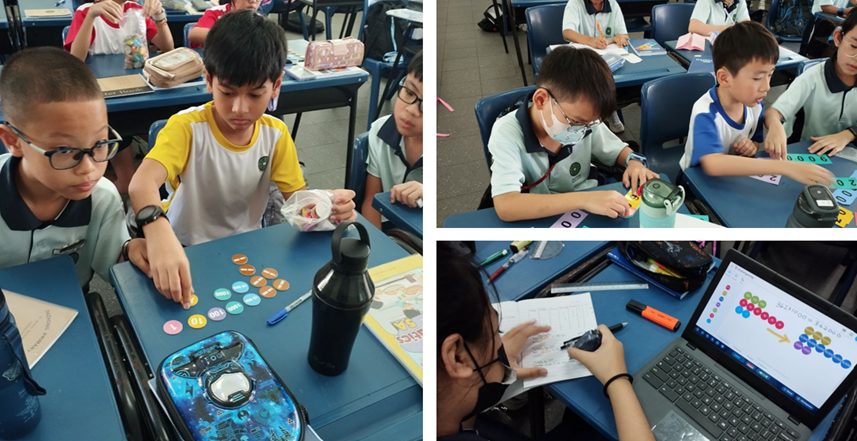


George Polya’s 4-Step Approach to Problem Solving: The S.T.E.P Thinking Routine was adopted from George Polya’s four-step approach for problem solving. It was intentionally created to scaffold our students’ critical and problem solving skills when tackling heuristics and problem sums. Students will make use of the four steps in the S.T.E.P Thinking Routine when solving Mathematics problems – Study the problem, Think of a plan, Execute the plan, Pause and reflect. The steps emphasize 4 key principles:
- Understand the problem
- Devise a plan
- Carry out the plan
- Review/Extend
The S.T.E.P Thinking Routine is incorporated into the design of our Progressive Approach to Teaching Heuristic and Skills (P.A.T.H.S) Package, a termly package that introduces two or three heuristic skills to students progressively.
Learning Mathematics is more than just learning concepts and skills. Equally important are the cognitive and metacognitive process skills. The processes are learned through carefully constructed learning experiences enacted via our department programmes.
Milestone Programmes:
National Day Celebrations with Mathematics Exploration Week (MEW): As part of the school’s National Day celebrations, the Mathematics Department collaborated with the CCE Department to help Primary 1 to Primary 6 students:
- use mathematical skills to make decisions concerning real-life scenarios, and
- develop citizenship dispositions through joyful learning experiences.
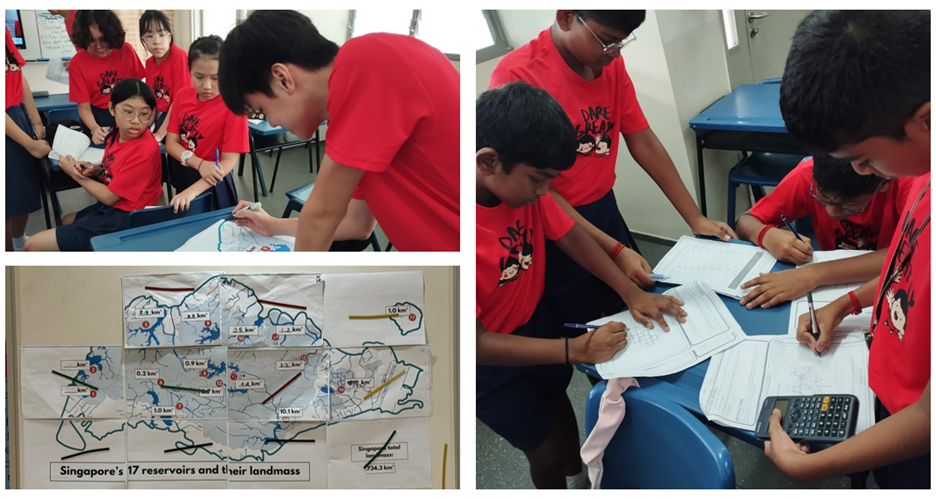
All students were engaged in deep and joyful learning as they participated in the various Mathematics recess booth activities to learn more about Singapore as well as the environmental issues delineating the SG Green Plan 2030.


Mathematics Trails & Learning Journeys: Our Primary 1 and Primary 2 students cultivated the joy of learning as they embarked on a Mathematics Trail around the school, including at our very own Butterfly Garden! They had the opportunity to experience Mathematics in an authentic, real-life environment at the various learning stations around school.

KooBits and SLS Adaptive Learning System (ALS): All Primary 1 to 6 students are provided access to KooBits, a Mathematics learning portal that empowers students to be self-directed students who learn independently with minimal teacher supervision. Additionally, our school closely works with parents in promoting the use of the SLS Adaptive Learning System (ALS), a system that provides a personalised learning pathway for each student according to their strengths and needs.
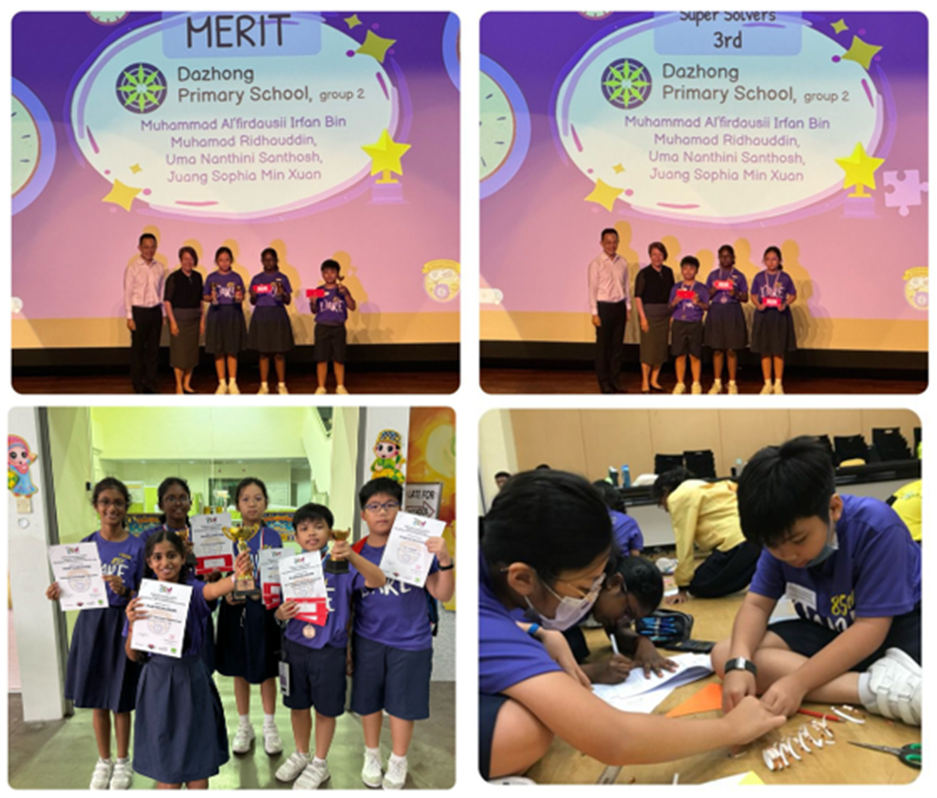
Mathematics in Dazhong is shaped by our direction of Mastery of Maths for Life. This takes place in two ways: (1) Cultivating the Joy of Learning, and (2) Building Confidence through Mastery. Along this direction, key milestone programmes are designed to promote conceptual understanding by sense-making through stories.
The broad aims of Mathematics education in Dazhong are aligned to that of the National curriculum. They are to enable students to:
- acquire & apply mathematical concepts & skills;
- develop cognitive & metacognitive skills through a mathematical approach to problem solving; &
- develop positive attitudes towards Mathematics.
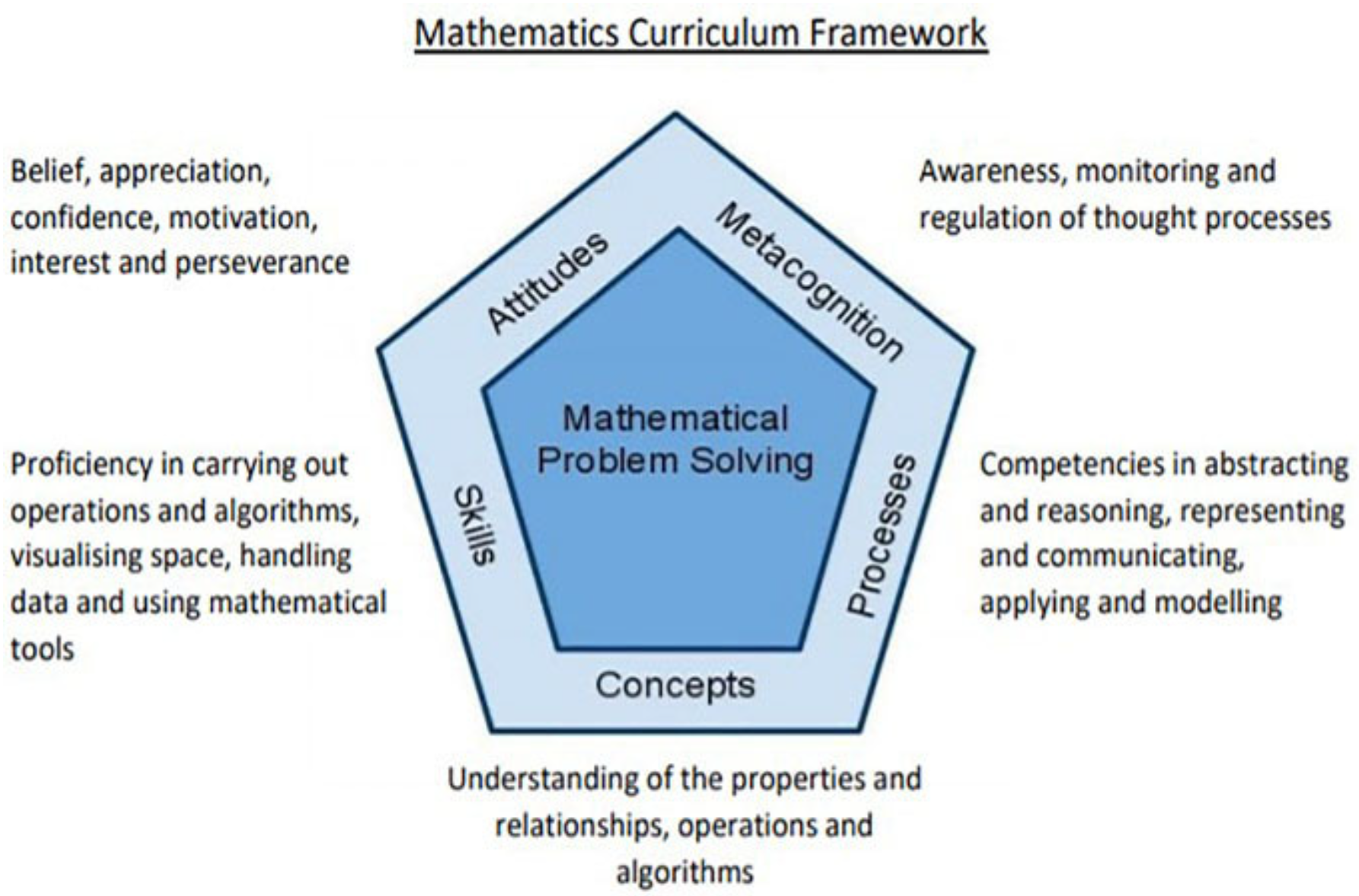
To develop our students to acquire and apply the necessary skills, concepts, processes, attitudes and metacognition towards learning Mathematics, the department carefully designs and plans suitable learning experiences (LEs) both in and out of the classroom. Such LEs help students to activate their learning and promote critical and inventive thinking. At suitable milestone checkpoints, we assess and monitor their learning.
Department Key Approaches & Programmes
Authentic learning experiences: In line with our Mathematics Department’s approach of promoting the love for Mathematics learning through authentic learning experiences and our belief that our students learn best through purposeful play, we provide a wide range of learning experiences for students in our Mathematics classrooms. For instance, when teaching the topic of ‘Angles’ to middle-primary students, we provide our students with opportunities to find angles in the environment and use a ‘paper right angle’ to identify right angles, obtuse angles and acute angles.


Metacognitive Strategies: Metacognition, or the ability to think about one's own thinking, is a crucial skill in the realm of Mathematics teaching and learning. When teaching problem solving, students engage in group discussions to share their thought processes as well as reflect on their problem-solving strategies and decisions, promoting metacognitive awareness. By monitoring their own thinking processes, students gained self-awareness, essential for ongoing learning and growth. Additionally, it supported metacognitive regulation by enabling adjustments based on feedback and experience.
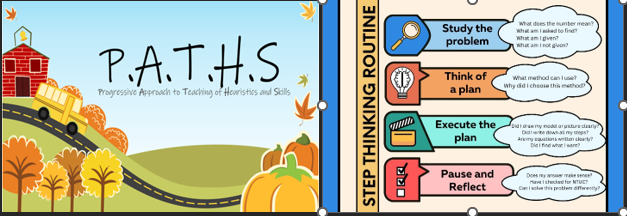
Student Learning Space Pedagogical Scaffold (SLS PS): The department also adopts the SLS PS in lesson planning and delivery. Relevant ICT platforms/tools are used to activate learning, promote thinking and discussion, and to visualise students’ thinking are researched and designed via our Professional Learning Time (PLT) and implemented in our lessons.
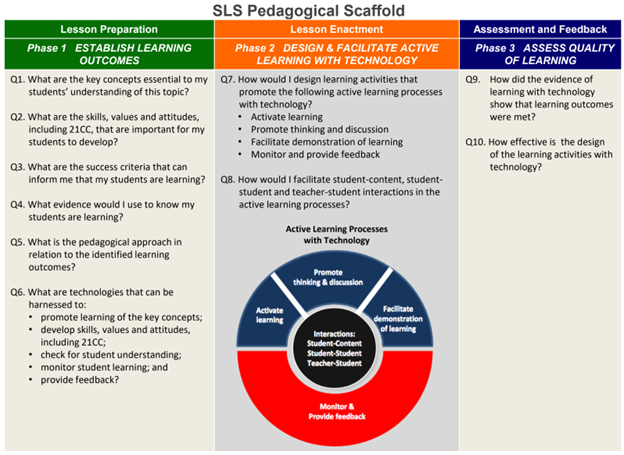
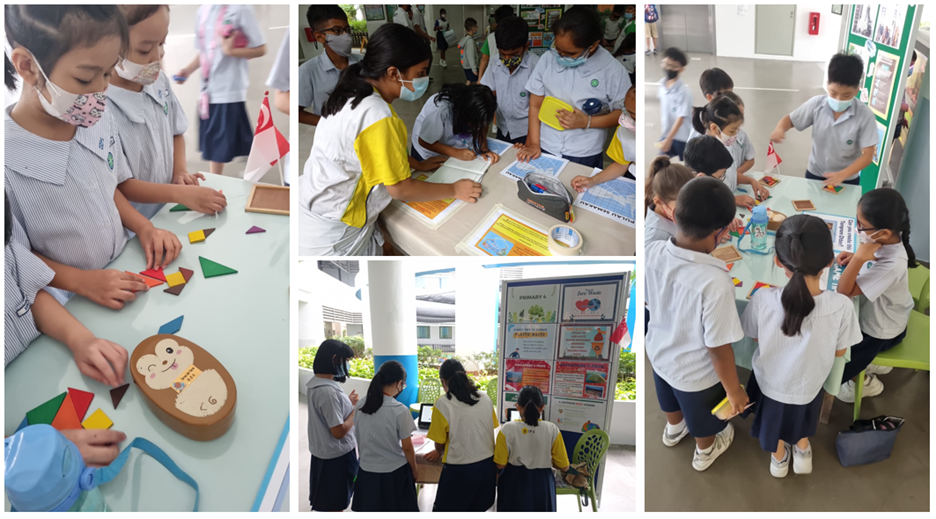
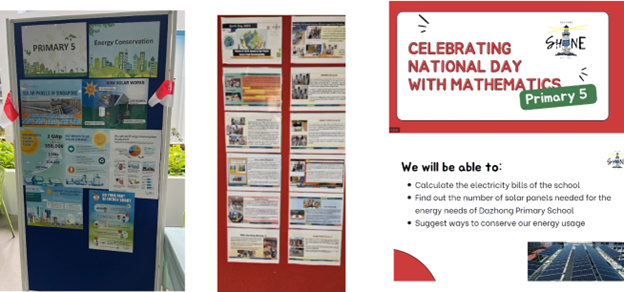
Mathematics Recess Play: The Mathematics Recess Play programme seeks to promote Maths factual fluency among our students. Selected Mathematics monitors were empowered to engage students in learning Mathematical concepts using a Maths app and also explain how they could improve their Maths skills. Many students were excited to participate in the experience to learn and improve their Maths skills in a fun way.

Stretch Programmes:
E2K Mathematics Programme: Selected Primary 4 and Primary 5 students participate in the E2K Mathematics Programme, which aims to develop students’ mathematical thinking skills and deepen their conceptual understanding through an inquiry approach. Developed by the Israel Centre for Excellence through Education (ICEE), students who demonstrate strong interest and ability in Mathematics will have opportunities to work independently or collaborate with their peers and foster independence in mathematical thinking skills through this programme. The rich learning experiences offered by the programme will help students gain important 21st century competencies such as critical and inventive thinking and effective communication skills.
Mathematics Competitions: Selected Primary 4 to Primary 6 students are invited to participate in Mathematics competitions, gaining exposure to intellectually challenging Mathematics questions that stretches their inner potential in the subject. Our students have participated in the following competitions:
- Singapore Mathematical Olympiad for Primary Schools (SMOPS)
- Raffles Institution's Primary Mathematics World Contest (RIPMWC)
- National Mathematical Olympiad of Singapore (NMOS)
- River Valley High School Science, Technology, Engineering and Mathematics Festival (RV STEM Fest)
- Primary Mathematics Project Competition

Support Programmes:
LSM: The Learning Support for Mathematics (LSM) programme is designed to provide early intervention support in mathematics to our students who may need additional support in acquiring basic numeracy skills when they enter Primary 1 and will continue, if deem necessary, in Primary 2 to Primary 4. There is an emphasis on ensuring that students have the necessary prerequisites before learning a new topic, hands-on learning with manipulatives, and reasoning and communication in the learning of mathematics.

